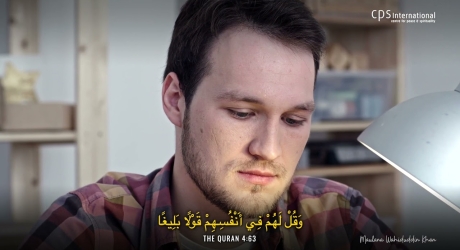Islam gives great importance to patience. It holds out the promise of immense reward for those who practice patience. Thus, the Quran (39: 10) says: ‘Truly, those who persevere patiently will be requited without measure.’ Elsewhere, the Quran (76: 12) says: ‘[…] and their reward for being patient will be a Garden and silk [cloth ing].’
This is the reward for patience that people can earn in the Hereafter. But there is reward in this world too. Patience helps save you from despair. If you fall prey to the psyche of despair you will live in constant uncertainty. You cannot plan the course of your life confidently nor achieve anything great.
I would like to say a few words about dawah work. You know at present, there are more than one billion Muslims throughout the world. They are living in every country. In these countries, there are non-Muslims in their neighbourhood.
It is a fact that these Muslims are engaged in Muslim empowerment, however, it is not yielding any required result. Why this failure? According to my analysis the reason is that they have failed to receive God's help. It is a fact that in this world you cannot achieve any result without the help of God. If you read the Quran and Hadith, you will find that the greatest duty of a Muslim is dawah work or shahadat, which is dawah work. It is the duty of Muslims to do dawah work, but they have abandoned this duty of theirs.
It is not possible to achieve any result without following the guidance of God Almighty. Muslims must recognize this fact. They must engage in dawah empowerment, rather than Muslim empowerment. Their duty is to focus on dawah empowerment. Muslims must know this fact and re-plan and reorganize their activities around this goal. They must do dawah work in all these non-Muslim countries where they are residing.
Requirements of Dawah Work
What is dawah work or dawah empowerment? Dawah empowerment is a great job or task. It requires whole empowerment. It begins from self-preparation. You must begin by preparing yourself for this cause. When you want to convey God’s message to others, you must first discover yourself the message of God and the creation plan of God. Without preparing yourself you cannot do dawah work properly. There is also a very important condition, that is, you must abandon your hateful nature. According to my experience, all Muslims have developed hate for non-Muslims. They think all non-Muslims are enemies of Islam and are conspirators. This kind of thinking has developed hate in the heart of present Muslims. If you want to do dawah work, if you want to make yourself capable for receiving divine blessing, then you have to abandon hateful thinking and develop well-wishing sentiment for non-Muslims.
There is a term in the business circle called customer-friendly behaviour. Similarly, a dayee should adopt madu-friendly behaviour. A dayee must abandon hate towards these non-Muslims. Then there are some other requirements. You have to read the minds of your madu. If you want to address their minds, you have to first understand what their mind is and what their thinking is. You have to objectively study the minds of these non-Muslim nations. Without knowing their mind, you cannot address their mind.
Then, simply announcement is not enough. You have to be very sincere. You have to make the madu your concern. Otherwise, you cannot fulfil this duty towards them. There is a wrong notion among Muslims that if they perform namaz or keep roza, that would be enough for attaining Paradise. This is wrong way of thinking. Muslims must know that simply doing these is not enough. The Prophet was directed by God to do inzar and tabshir, that he should address the mind of his neighbours, failing which God would not forgive him (5:67). That is, if you are not eager for the salvation of others, your own salvation will be at stake. Why is this so? Because, when you discover iman and the truth of Islam, you inculcate a new kind of thinking in your mind. That is, you have to make people aware of the Creation Plan of God. It is God’s concern that people be made aware of the creation plan. Who will do this work? God wants that people become aware of this before the Doomsday strikes. This task can be done only by Muslims. When Muslims declare that they are believers in the Quran, it becomes their duty to convey the message of God to all mankind. So that people may be aware of the Creation Plan, the purpose of life, and for what they are accountable before God. All these things are part of dawah work. Dawah work means to make people aware of the Creation Plan of God. It is very important. It is the duty of every Muslim, every Muslim man and woman. It is farz-e-ayn and not farz-e-kifaya. That is, every Muslim man and woman has to do dawah work according to his or her capacity. In this age doing, dawah work is very easy, since we are living in the age of the printing press.
Doing Job is Not Enough
The best way to do dawah is to adopt the formula of “one man, two mission”. You are living in different countries. It is your right to secure jobs, but it is not right to totally involve yourself in business or job. You have to divide your time and energy. You have to adopt the formula: one man, two mission. That is, partly you have to engage yourself in job and business and partly you have to engage in the dawah mission. So, you have to re-plan your activities in this way. People generally know only of how to earn money, how to do job or business. But this is not enough. Living a life of this kind is like living like an animal, one become an earning animal. One who is not doing dawah and is only engaged in job is like an earning animal. This kind or pattern of like is not acceptable to God. I will ask everyone of you to reconsider your pattern of life, to rethink your pattern of like, to reorganize, re-plan your pattern of life. You have to add dawah activities to your daily life.
It is a blessing of God that Muslims are living in almost every country. Due to modern communication and opportunities, they are living in every country. You have to take this as an opportunity for dawah work. If due to modern communication you are living in every country, then it is good. But at the same time you have to take it as an opportunity for dawah. In every country there are non-Muslims in your neighbourhood and in workplace. All these people are your responsibility. You have to fulfil your responsibility towards them. If you fail to do dawah before them, you will be responsible before God.
Dawah is not meant to establish your superiority over others, or to establish your pride. This is not dawah work. Dawah work is to make people aware of the creation plan of God. This is not community work, but it is divine work. We have to do dawah work, but with the right intention. We have to dawah with the right planning. When you do dawah work with all these requirements, that is then dawah empowerment. I have used the word “empowerment” because it is a comprehensive word, which includes all of your life. It covers all of your activity, your thinking, dealing, and behaviour. When you perform dawah in this manner then you will be able to get the credit of dawah, otherwise not. You must be very sincere and serious in this regard. All of us are here in this world only for a temporary period. Afterwards we will die and be presented before God. We are not here for eternity, but for a temporary period of sixty to seventy years. After completing this short period, we will die and we will be presented before God in the world hereafter.
We will be acceptable to God if we perform our dawah duty in this world. Otherwise, we won’t find entry into Paradise. Dawah begins from preparation and well-wishing. The journey ends in the Hereafter by finding entry into Paradise.
Question and Answer
Q1. What is the difference between zakat and dawah?
A1. Zakat represents the giving culture. You have to live in society as giver. Zakat is a part of the giving culture. The other part of this giving culture is dawah. Zakat is giving something in terms of money, while dawah is giving something more than that, that is, the ticket to Paradise. Thus, zakat and dawah are two aspects of the same culture. One aspect of this giving culutre is zakat while, the other is dawah.
Q2. What is the difference between an earning animal and a dayee?
A2. All the animals live for their own interest. Every animal knows only its own interest. But the dayee also knows the interest of others. When you do dawah work, it means that you have developed concern for others. Animals don’t know this kind of living, they know nothing about others. While, a dayee is one who has developed concern for others. This is a very high quality. Only such people will find entry into Paradise. Man is also an animal in the physical sense. But man also has a soul and a mind. If he fails to do dawah, he is reduced to being an animal. But when he discovers his duty, he performs dawah work and engages in divine work that means he has raised himself to the level of a human being. To establish your humanity, it is required that you do dawah work.
Q3. Is dawah farz-e-ayn or farz-e-kifaya?
A3. These terms as farz-e-ayn and farz-e-kifaya were coined during the Abbasid period. The Prophet never uttered these words. So, we will take dawah as obligatory for all.
The Quran says: “Aqim us salat”, that is, “Offer namaz”. Similarly, the Quran says: “Udu ila sabil rabbik”, that is, “Call to the way of your Lord.” Both these injunctions, that is the injunction of prayer and the injunction to to dawah are in the language of command (amr ka segha), that is, in the imperative. Nowhere in the Quran is it mentioned that dawah is farz-e-kifaya. The Quran says in Chapter Yusuf: “I call to the way of Lord and those who follow me [that is, Muslims] also have to call to God.” (12:108). Thus, the terms of farz-e-ayn and farz-e-kifaya were developed later. You do not have the right to put those conditions that the Quran doesn’t put. If the Quran says do dawah in the language of command, then you will have to follow this, as you follow it when it says offer namaz. Due to the wrong categorization of farz-e-ayn and farz-e-kifaya, Muslims have abandoned dawah. In the time of the Prophet, all Sahabas were muqris, that is, they recited the Quran to people. This means that all Sahaba did dawah work.
In case of ibadat, all people have to take reward from it. All have the concern to take the reward from ibadat. This is the reason why all people perform their prayers, keep fasts, and so on. Dawah is also ibadat. Thus, dawah is obligatory. As far as farz-e-kifaya is concerned, it is not meant for every individual. Rather, its purpose is to fulfil a common social need. For example, if there is absence of water at some place, and if a person builds a well so that water now becomes available to all, then this is an example of farz-e-kifaya. Others in the community will now not have to to build wells, as one person has fulfilled this obligation for all. The need of all has been fulfilled. But the case of ibadat is different, because every person needs the reward accrued from performing ibadat. That’s why ibadat is farz-e-ayn, and this is also the reason why dawah is farz-e-ayn. While, the building of a well is farz-e-kifaya. Even in the Abbasid period, farz-e-kifaya was a term used for building infrastructure such as wells, bridges, etc. But now in their period of degeneration, Muslims have extended the meaning of farz-e-kifaya to include dawah. Even in the Abbasid period when these terms were coined, dawah was not called farz-e-kifaya.










